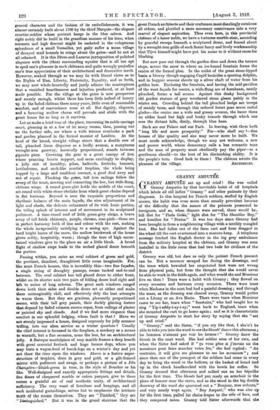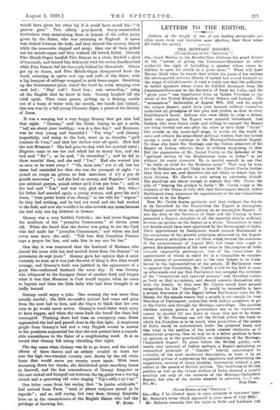GRANNY AMPUTEE.
GRANNY AMPUTEE sat up and cried ! She was called Granny Amputee by that inevitable habit of all hospitals which labels all old ladies " Granny " and other patients by their diagnosis. In this hospital for French soldiers, staffed by English nurses, the habit was even more than usually prevalent because of the difficulty that the names of the patients presented to foreigners, and so, when dinners were served, there would be: full diet for " Pieds Gales," light diet for " The Shoulder Boy," and bouillon for " Brains." It was ten days since Granny had been brought in from a neighbouring village with a terribly mangled foot. She had fallen out of the farm cart and been dragged in the wheel till the cart overturned into a manure-heap. A telephone message fetched the English doctor in the big grey ambulance from the military hospital at the château, and Granny was soon installed in the little room that had two beds for civilians of the district.
Granny was old, but duce as only the patient French peasant can be. Not a murmur escaped her during the dressings, and the tears which bewailed her amputated foot were not wrung from physical pain, but from the thought that she would never be able to work in the fields again, and what would she and Monsieur live on then ? Tears were a habit with Granny ; they flowed on every occasion and between every occasion. There were tears when Madame in the next bed had a painful dressing ; and through the tears, as the dressing was cleared away, Granny would patter out a. Litany or an Ave Maria. There were tears when Monsieur came to see her, tears when " Seestaire," who had taught her to sing " Yip-i-addy-i-ay-i-ay," went back to England, tears when she mounted the cart to go home again ; and se it is characteristic of Granny Amputee to start her story by saying that she " sat up and cried."
" Granny," said the Sister, " if you cry like that, I sha'n't be able to take you into the ward to see the blesses' dance this afternoon ; les hommes n'aiment pas voir les larmes ! " Granny knew the blesses in the next ward. She had soldier sons of her own, and when the Sister had asked if " ea vous gene si j'envoie un des messieurs pour faire marcher votre feu," she had replied ; " Au contraire, it will give me pleasure to see lee messieurs " ; and since then one of the youngest of the soldiers had come in every day to bring the wood or the bellows, or the basket of bread tied up in the check handkerchief with the bowls for coffee. So Granny dressed that afternoon and sallied out on her bequilles for the first time. The blesses had put ready an armchair in the place of honour near the stove, and as she stood in the big double doorway of the ward she quavered out a " Bonjour, mes enfants," and very nearly wept again. " Boy Ampute," who was also up for the first time, pulled his chain-longue to the side of hers, and they compared notes. Granny told Sister afterwards that she would have given her other leg if it could have saved his—" to pauvre gars." Two elderly grey-haired, heavy-moustached territoriaux were entertaining them in honour of the coffee party given by the Sister, who was returning to England. A space was cleared between the beds, and they danced the country dances while the eamaratiee clapped and sang ; then one of them pulled out his mouth-organ and they waltzed till breath failed. Gravely Pere Mouth-Organ handed Pere Dancer to a chair, fetched a glass of lemonade, and fanned him delicately with his cotton handkerchief while Peke Dancer hid his face coyly behind his blue calotte. Others got up to dance, and Pere Mouth-Organ disappeared from the Ward, returning in apron and cap and cuffs of the Sister, with a big bouquet of cabbage wrapped in pink tissue-paper. Snatching up the thermometer-glass, round the ward he went, stooping over each bed : " Slep' well ? Good boy ; rain oatzandogs," using all the English that he knew in turn. Granny laughed till she cried again. Then came games, picking up a floating candle out of a basin of water with the mouth, the hands tied behind ; this was won by a tall young Chasseur Alpin, a priest of the Society of Jesus.
It was a weeping but a very happy Granny that got into bed that night. " Granny," said the Sister, hoping to get a smile, " tell me about your wedding; was it a fine day ? and Monsieur, was he very young and beautiful ? " Pas trop," said Granny impartially, and rising to the bait, went on to describe " tombait de l'eau," and that her clothes were all spoilt. How had she met Monsieur ? She had gone to stay with her married sister ; Magnien came to see her and asked her to marry him, and she had said " No " ; so he said, " Je revien.drai " ; and he did in three months' time, and she said " Yes." Had she wanted him as soon as he went away ? " Oh. mais non," not at all, but her sister had reminded her that she was the youngest of eight, " et quand on coupe un gateau en huit morceaux it n'y a pas de grands morceaux " ; and she had no money, and Magnien " n'etait pas mechant garcon, quand meme n'est pas beau " ; and so she had said " Yes," and was very glad she had. But, Miss his father had married again, a young woman, and gave his son's share, " traits petits bouts d'un champ," to his wife for " argent." So they had nothing, and he had cut wood and she had worked in the field, and now she wouldn't be able to work any more, because she had only one leg Velatant en larnaes).
Granny was a very faithful Catholic ; she had never forgotten the incidents of her " premiere Communion " at eleven years old. When she heard that the doctor was going to see the Cure who had made her " premiere Communion," and whom she had never seen since, she said : "Tell him that Josephine Feetout says a prayer for him, and asks him to say one for her."
One day it was rumoured that the husband of Madame, who shared the room with her, had arrived home from the Somme " en permission de sept jours." Granny gave her opinion that it must certainly be true, as it was just the sort of thing is Bon Dien would arrange, and Granny's faith was justified in the appearance of a great blue-uniformed husband the same day. It was Granny who whispered to the foreigner Sister of another faith and tongue what it was that Monsieur le Cure would require when he came to baptize and bless the little baby who had been brought in so badly burned.
Granny could enjoy a joke. One evening she was more than usually tearful ; the fifth successive patient had come and gone from the next bed to hers, and she began to think that her own turn to go would never arrive. Granny's ward-Sister went away to have supper, and when she came back she found the clean bed reoccupied. Thinking there had been an emergency case, Sister approached the bed and peered close in the dim light. A suspicious gurgle from Granny's bed and a very English accent in answer to her questions acquainted her that the new patient bore a remark- able resemblance to the Sister of a neighbouring ward. It is on record that Granny fell asleep chuckling that night.
The day came when Granny was fit to go home, and the united efforts of three Sisters and an orderly availed to hoist her into the high two-wheeled country cart, drawn by the old white horse that would never see twenty years again. With tears streaming down her cheeks, she distributed great smacking kisses in farewell, and the last remembrance of Granny Amputee as the cart rocked and bumped out between the big gates was a waving crutch and a, quavering old voice singing " Yip-i-addy-i-ay-i-ay!"
One letter came from her saying that "la jambe artificielle " had arrived from Paris, "mail je pleura toujours quand je is regards " ; and so, still crying, but very dear, Granny Amputee lives on in the remembrance of the English Sisters who had the



























 Previous page
Previous page